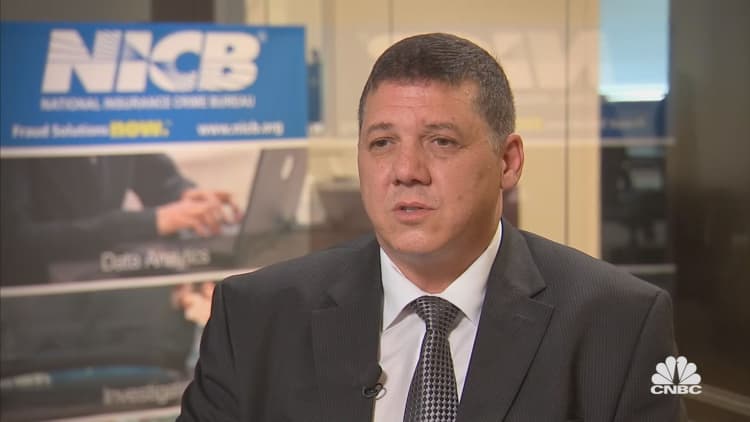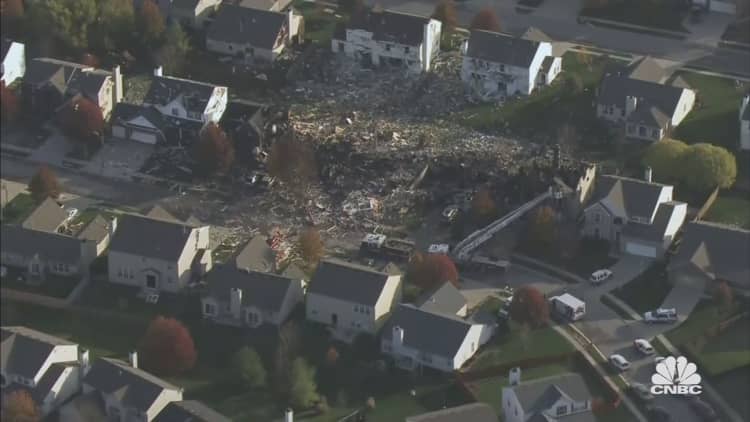Insurance fraud is a massive problem in the U.S. — so big that the dollar amount would be enough to qualify for the Fortune 500.
In congressional testimony earlier this month, the head of the Insurance Information Institute estimated that property-casualty and auto insurance fraud alone totals more than $30 billion a year. In other words, nearly 10 cents of every dollar in claims the industry pays is going to a fraudster. And whether you know it or not, one of those fraudsters may be you.
"There's a whole realm of things that people do without even knowing what they're doing or knowing that they're committing fraud," said Robert Vetrano, a special agent at the National Insurance Crime Bureau, a not-for-profit organization funded by the insurance industry.
He is not talking about high-profile frauds like the one featured on the next episode of CNBC's "American Greed." Mark Leonard and his girlfriend — Monserrate Shirley — blew up their home in the leafy Indianapolis neighborhood of Richmond Hill in 2012 in hopes of collecting $300,000 in insurance proceeds. Two neighbors were killed in the explosion, which damaged or destroyed 100 homes. Leonard, Shirley and three others went to prison.
As dramatic and devastating as those types of insurance fraud are, less noticed frauds happen every day across the country. Put them all together, and they are far more costly in monetary terms than the Richmond Hill disaster.
"The FBI insurance fraud statistics state that everybody who has insurance is paying between $400 and $700 more in their premiums for their insurance," Vetrano said.
Are you an insurance fraudster?
You consider yourself an honest person, and you would not dream of committing a crime, right? But millions of homeowners are guilty of one of the most pervasive types of insurance fraud, known as claim inflation.
"Someone will have an item, part of their property stolen, and they'll either raise the cost of that property or include additional property," Vetrano explained. "And people tend to believe that it's OK because they've been paying insurance premiums for many years and this is kind of a way to recoup some of the money they laid out for insurance."
The problem is even more pervasive when it comes to auto insurance claims. After all, it is easier for a person facing financial difficulties to consider setting fire to their car than it is to think about burning down their home.
"We see more people burning their vehicles to get out of high lease payments or high loan payments," Vetrano said.
But a far more insidious type of auto insurance fraud involves run-of-the-mill accident claims. You may think it is harmless to include in your claim a scratch or dent that was already there, but that, too, is insurance fraud.
In another common scam, it is the body shop — not the policyholder — that instigates the fraud.
"Someone has a little fender bender with their vehicle and they bring their car to the body shop. Maybe they needed a new bumper cover, which could cost $500 to replace," Vetrano explained.
However, your insurance policy has a $1,000 deductible, meaning none of the damage is covered. But the body shop owner has an idea.
"Because you're so nice, we're going to cover your deductible so you have no out-of-pocket expense," Vetrano said.
You are relieved that you will save $500, so you give the go-ahead.
"Then what happens is behind closed doors they'll enhance the damages to the vehicle to make it appear that the vehicle was more damaged than it actually was. And then they'll repair the damages they caused, which will cost them nothing, usually banging out a fender or repainting something. And so that $500 bumper cover turns out to be a $5,000 claim," Vetrano said.
The body shop owner gets to keep the extra cash from the insurance company, and you have not paid a dime.
You become a party to the fraud if you see the statement from your insurance company that your vehicle sustained $5,000 in damages and you do not immediately raise a red flag.
"That happens a lot," Vetrano said. "You won't question it to anybody because you had no out-of-pocket expense."

Guarding against fraud
Vetrano says 42 states and the District of Columbia now have full-time insurance fraud-fighting operations, all of which work closely with the National Insurance Crime Bureau. He says together, they are getting better all the time at spotting insurance fraud and shutting it down.
"Without giving away too many of our indicators," Vetrano said, "sometimes people cannot provide documentation of their property that they're claiming was damaged or stolen, they can't provide receipts, sometimes they'll report to the insurance company more items than they reported to the police when they responded."
Investigators now also routinely look for financial difficulties like foreclosure or bankruptcy that might provide an incentive for a desperate policyholder to commit fraud.
The industry is also seeing an increase in referrals from the public — a positive sign that people are becoming more aware of the problem. If you suspect someone is committing insurance fraud, call your state's insurance fraud bureau — the NICB has a handy online directory. You can also report fraud via the NICB's toll-free number, 1-800-TEL-NICB (835-6422), or on the bureau's website; you can even download a mobile fraud-reporting app.
Why should you care?
Perhaps the greatest obstacle that insurance fraud fighters face is the widespread perception that it is a victimless crime.
"The insurance companies are these big insurance companies and what's the difference if they have to pay me a couple thousand dollars, you know, they have plenty of money, or, I've been paying my insurance premiums for years and I never had a claim, and this is a good way for me to make some money," Vetrano said.
Of course, nothing could be further from the truth. Vetrano notes that the true cost of insurance fraud goes far beyond the higher premiums we all pay.
"Higher insurance premiums make the cost of everything go up. Companies that have to do business have to have insurance; they have to have worker's compensation insurance, liability insurance, insurance for their vehicles. When they're paying higher premiums, they have to raise the cost of their goods and services."
In one Indianapolis neighborhood, the true cost of Leonard's and Shirley's attempted insurance fraud is immeasurable. Survivors in Richmond Hill are still struggling to put their lives back together. Investigators got to the bottom of that disaster relatively fast. Combatting the less dramatic, everyday epidemic of insurance fraud is a constant battle.
See how a brazen money grab turns deadly — and how investigators solve the mystery — on an all new episode of "American Greed," Monday, Aug. 14 at 10 p.m. ET/PT on CNBC.




